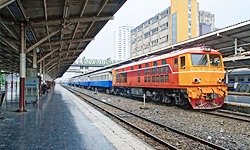Travellers have many options for getting around Thailand. There is a wide range of air, train, bus and boat services that can take you to almost any point in the Kingdom.
By Air
Key tourist destinations in Thailand are served by many airlines including budget carriers. Most airlines that fly within Thailand operate out of the domestic terminal at Suvarnabhumi Airport, serving major cities and towns throughout the Kingdom. Don Mueang Airport, the former international airport, also serves as a hub for domestic air travel.

Airlines providing domestic services within Thailand include:
AirAsia
Bangkok Airways
Nok Air
Orient Thai
Thai Airways
For more information on how to get from the airport into Bangkok, visit the Suvarnabhumi Airport Web site and choose the transport option you want from the “PUBLIC CAR SERVICE” menu.
When travelling from Suvarnabhumi Airport into Bangkok, visitors to Thailand (especially first-time visitors) should take certain precautions:
Use only official transportation by going to the counter for the service you wish to use. Avoid people who approach you in the terminal building to offer transportation services, even if they claim they are official, as they may represent unlicensed operators.
If a taxi driver tells you the accommodations you have arranged in Bangkok are closed for any reason, inferior, or offers you a better deal at a nicer location, gently insist that the driver take you to your original destination. Some drivers may try to redirect you to other accommodations so they can collect a commission.
If you are going into central Bangkok and want to save time, ask the driver to use the tollway. You will have to pay the tolls.
There is a 50-Baht surcharge for taxis from the airport. This surcharge is not displayed on the meter, so the taxi driver will add it to the fare shown when you reach your destination. This surcharge is legitimate and you must pay it. There are no other surcharges that you need to pay.
Make sure you have some small-denomination banknotes on hand, including 20, 50 and 100-Baht notes, or get some from a foreign exchange counter before you leave the airport. Many taxi drivers cannot or will not make change for larger-denomination banknotes.
By Train
The State Railway of Thailand (SRT) offers passenger train services to key tourist destinations in the northern, northeastern, eastern and southern parts of Thailand. These services originate from Hua Lampong station in central Bangkok. Most trains provide services in three classes, which are first-class with private, air conditioned compartments; second-class with air conditioned sleeper cars; and third class with non-air conditioned cars that have bench seating.
For more information or for online booking, visit the State Railway of Thailand Web site.
When travelling by train, visitors to Thailand should take certain precautions:
There are occasional instances of organized robbery of passengers on trains along popular routes, especially during the night or on overnight trains. If your way is blocked by a stranger and another person is very close behind you, protect your belongings and move away. This can happen in the corridor of the train or on the platform at a station.
Do not accept food or drink offered by strangers, as these items may be drugged. It is better to carry your own food and drink or purchase them from the vendors on the train.
Feel free to alert authorities if you feel threatened in any way. Extra police are often assigned to ride trains on routes where crime occurs more often.
By Bus
Thailand has three types of bus services that tourists generally use. The first type is 1st class air-conditioned buses (sometimes called VIP buses) operated by private companies. These luxury intercity coaches offer scheduled services between major destinations throughout Thailand. They provide ample legroom and comfortable reclining seats. Depending on the operator and route, on-board services may include snacks, drinks, blankets, and attendants to take care of passengers.
The second type of bus service is provided by a state-owned enterprise called The Transport Co., Ltd., which runs scheduled services in all major regions of Thailand. It operates both air-conditioned and non-air conditioned buses. The Transport Co. also licenses private operators to run on some of its routes.
The third type of bus service is passenger van services by private operators that focus on tourist travel. They run on direct routes to popular tourist destinations as well as non-fixed routes. Passenger vans are also frequently used on charter tours for sightseeing. While passenger van services for tourists offer flexibility and convenience, tourists need to ensure they travel with a reputable, licensed operator. Passenger van services that solicit customers from the street are not always licensed and often provide poor, unsafe or overpriced service. To be sure that your travel in a licensed passenger van, book your seats a reputable tour company or travel agent.
When travelling by bus, visitors to Thailand should take certain precautions:
There are occasional instances of organized robbery of passengers on buses, especially during the night or on overnight services. If your way is blocked by a stranger and another person is very close behind you, protect your belongings and move away. This can happen in the aisle of the bus, on the platform at a station, or at a rest stop.
Do not accept food or drink offered by strangers, as these items may be drugged. It is better to carry your own food and drink or purchase them from vendors at a rest stop.
There is occasional theft of items from the luggage compartments of buses. Try to travel light and keep your belongings with you if you can. Watch your belongings closely at stops where the luggage compartment of the bus is open.
Overnight bus travel poses a higher risk of accidents due to driver fatigue and a greater number of commercial vehicles on the roads. Try and travel during the daytime or evening if possible.
Feel free to alert the bus driver or attendant or officials at rest stops if you feel threatened in any way.
By Boat
There are many ferries and privately-operated speedboat services connecting the mainland with islands in the Gulf of Thailand and the Andaman Sea. Fares for these services can be included in tour packages, paid through travel agents or paid at the point of departure.
When travelling by boat, visitors to Thailand should take certain precautions:
Ferries and speedboats are often overloaded with passengers. Try to avoid travelling by boat during peak times or on weekends to reduce your chances of being on an overloaded boat.
Check that the boat has proper safety equipment including life preservers before boarding.
Use only licensed ferry and speedboat operators and avoid independent operators who use personal rather than licensed boats.




